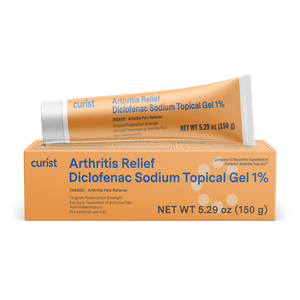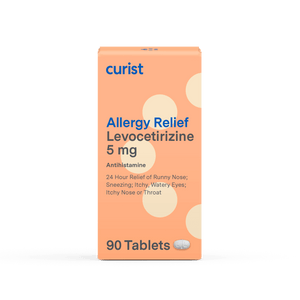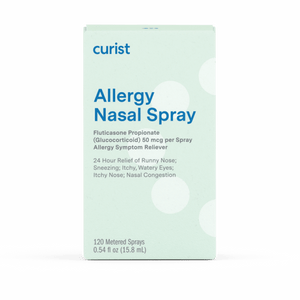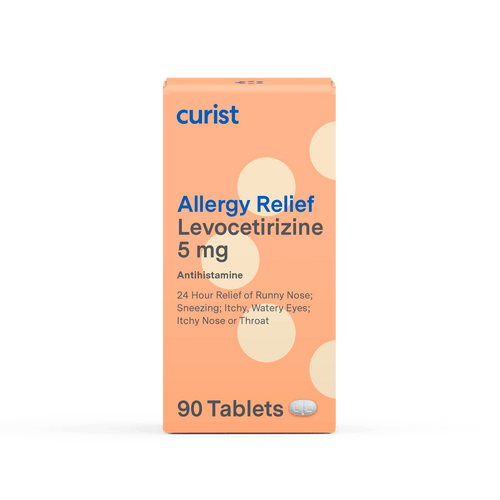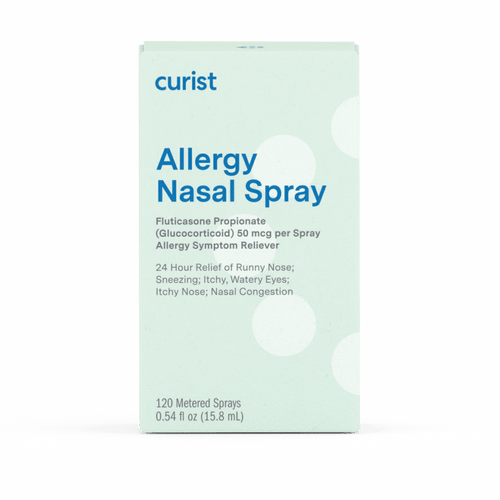Curist delivers over-the-counter medicines to your door at a fraction of the price of traditional brands. We hope everyone stays safe and healthy during this time.
Have you ever wondered how allergies and antihistamines affect joint pain? Read on to learn more about how they are related and what you can do to manage your symptoms.
Do Allergies Affect Joint Pain? Can Allergies Give You Achy Joints?
Allergies can contribute to joint pain, and it is fairly common for people to experience an increase in sore and aching joints during allergy season. The association between allergies and joint pain is related to inflammation. When exposed to allergens in the environment, such as pollen, ragweed, pet dander, or mold, our immune system responds by producing IgE antibodies. These antibodies lead to the release of inflammatory signals (including histamine) that trigger symptoms including itching eyes, watery eyes, sneezing, nasal congestion, fatigue, and coughing. In arthritis, inflammation of the joints can result in pain, limited range of motion, and fatigue. It is unsurprising, then, for many people to experience allergy symptoms and joint pain together.
What Kind of Allergies Cause Joint Pain?
Although all allergic reactions trigger the body’s inflammatory response, there does not appear to be a conclusive answer in regards to what kinds of allergies exacerbate joint pain. However, most reported cases involve seasonal allergies. During seasonal allergies, the body experiences fatigue, sneezing, and coughing - which may also contribute to sore and aching joints.
Are Joint Pain and Arthritis Worse During Allergy Season?
Many people find that their joint pain and arthritis symptoms are worse during allergy season. This is likely due to the combination of increased inflammation and fatigue, which can exacerbate sore and aching joints.
Can Antihistamines Reduce Joint Pain and Help with Joint Inflammation from Arthritis?
Antihistamines are a common class of medications that can be found over-the-counter (OTC) to treat allergy symptoms and work by combatting the immune messenger histamine at its receptor. They are not typically recommended just for arthritis symptoms. However, if you feel that your seasonal allergies are intensifying your joint pain, starting with an antihistamine may provide optimal results for both conditions. If you have multiple health conditions and/or taking other medications, it is important to consult your doctor regarding safety and proper use before taking OTC medications.
What is the Best Antihistamine if I Have Allergies and Joint Pain?
The best antihistamine if you have allergies and joint pain will depend on your specific set of symptoms. For general seasonal allergies, we recommend second and third generation antihistamines, which have the lowest risk for side effects and longest lasting relief. Some examples of second and third generation antihistamines include Curist Allergy Relief (levocetirizine), fexofenadine, and loratadine.
First generation antihistamines relieve allergy symptoms for about 4 to 6 hours and are associated with cognitive side effects like dizziness, drowsiness, and fatigue, as well as anticholinergic effects like dry mouth, blurry vision, and increased heart rate. In contrast, second and third generation antihistamines have a longer duration of up to 24 hours and are unlikely to cause mental or anticholinergic side effects.
If you have multiple health conditions and/or taking other medications, it is important to consult your doctor regarding safety and proper use before taking antihistamines. For additional OTC recommendations for managing joint pain, see our pain management article.
Additional Tips to Manage Joint Pain and Arthritis During Allergy Season
In general, the best way to manage joint pain during allergy season is to identify the triggering allergens and limit your exposure to them. Some ways of doing this include:
- Keeping windows closed in your home and in your car
- Washing clothes regularly and drying them indoors
- Showering after being outdoors
- Turning on the air conditioner
- Using an air purifier
- Staying inside when it is windy or when pollen levels are highest
- Taking antihistamines before you go outside
In addition to managing allergies, incorporating light exercise into your routine and using hot or cold packs may help alleviate joint soreness and pain.
To learn more about arthritis treatment options, visit Best Anti-Inflammatory Drugs & NSAIDS for Arthritis or shop Curist Arthritis Relief (diclofenac gel).
Where Can I Find Antihistamines from Curist?
Local pharmacies and stores online like Curist provide Xyzal (levocetirizine) and do not need a prescription. Allegra (fexofenadine) can also be purchased without a prescription over-the-counter at your local grocery store or pharmacy.
At Curist, we develop FDA-approved equivalents to big brands in order to provide the same medicine relief but at half the price of the brands. Curist products are sold online and shipped directly to your door, and we carry Xyzal (levocetirizine) for your convenience.




